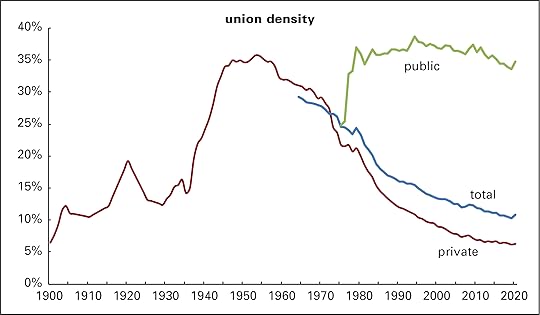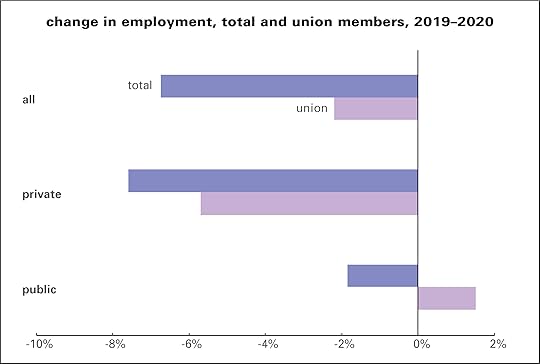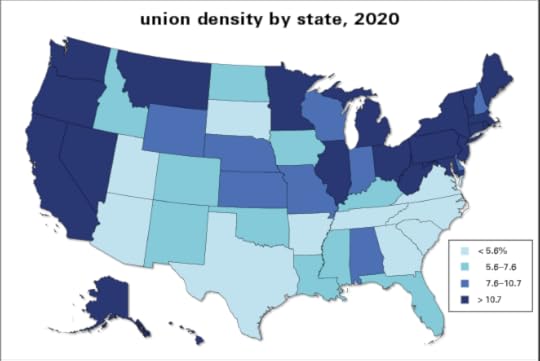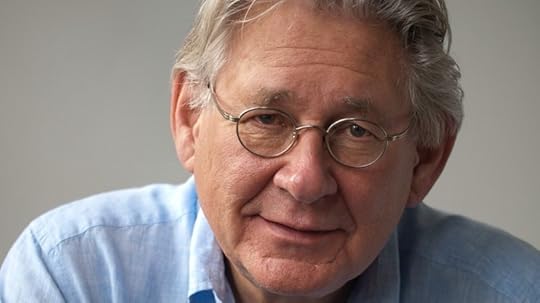Doug Henwood's Blog, page 29
February 4, 2021
Fresh audio product
Just added to my radio archive (click on date for link):
February 4, 2021 Katya Kazbek looks behind all the shiny stories about Russian dissident Alexi Navalny • Marianela D’Aprile offers a socialist critique of mutual aid (older article here)
January 28, 2021
Fresh audio product
Just added to my radio archive (click on date for link):
January 28, 2021 Sarah Buehler, a British Columbia-based climate activist, on the Keystone Pipeline and Biden’s climate policy • Chris Maisano, author of this article, on the work of Leo Panitch
January 22, 2021
Pandemic boosts union density
Union density—the share of employed workers belonging to unions—rose in 2020 for the first time since 2007 and 2008. Before that, you have to go back to 1979 to find another uptick. Those four years are the only increases in density since the modern BLS series begins in 1964.
Sadly, though, the rise wasn’t the result of any organizing victories. Union membership declined by 2.2% last year—but the pandemic drove down employment even more, 6.7%. As a result, density rose from 10.3% to 10.8%, bringing it back to where it was in 2016.
The increase was driven mainly by the public sector. In 2020, 6.3% of private-sector workers were union members, up 0.1 for the year (though still below 2018’s 6.4%). In the public sector, 34.8% of workers were union members, up 1.2 from 2019, and the highest since 2015. Here’s a graph of the full history. Private sector union density peaked in 1953 and has been declining with little interruption since. It’s now about where it was in 1900 (though those pre-BLS stats should be taken with a grain of salt).

Here’s a graph showing the change in total and union employment from 2019 to 2020. Note that while employment was down overall and in the private and public sectors, employment for union members fell less in the private sector and actually rose in the public. There’s an important message here: besides increasing wages, which you can read about in last year’s installment, having a union increases job security.

Finally, here’s a map of union density by state. There’s a notable geographic pattern, with unions most present in the Northeast, upper Midwest, and Pacific coast, and weakest in the South and interior West.

As with many things, 2020’s union density figures look to be an artifact of the pandemic. As I said last year:
There are a lot of things wrong with American unions. Most organize poorly, if at all. Politically they function mainly as ATMs and free labor pools for the Democratic party without getting much in return. But there’s no way to end the 40-year war on the US working class without getting union membership up….
And “up” doesn’t mean through COVID-19 quirks.
January 21, 2021
Fresh audio product
Just added to my radio archive (click on date for link):
January 21, 2021 Réka Juhász, co-author of this paper, on the shift from home to factory as a precedent for the shift from office to home today • Vanessa Williamson, author of this article, on the roots of “taxpayer” discourse in Southern elites’ successful attempt to disenfranchise black citizens and reverse Reconstruction
January 14, 2021
Fresh audio product
Just added to my radio archive (click on date for link):
January 14, 2021 Jodi Dean on Trump and American fascism • Quinn Slobodian, co-author of this article, on Querdenken, the eclectic German anti-mask movement that joins hippies and petty capitalists
January 7, 2021
Fresh audio product
Just added to my radio archive (click on date for link):
January 7, 2021 Vijoo Krishnan on the Indian farmer strikes • Yannet Lathrop, author of this report, on state and local minimum wage increases • Alex Peterson on the Alphabet Workers Union
January 2, 2021
Fresh audio product
Just added to my radio archive (click on date for link):
December 31, 2020 Vijay Prashad on farmer and worker strikes in India • Sarah Leonard and Natalie Adler on Lux, a new feminist magazine they’re editors at
December 24, 2020
In memory of Leo Panitch
[Here’s what I had to say on this week’s radio show about the marvelous Leo Panitch, who died on December 19. The show consists of two interviews, one from 2012 with Leo and Sam Gindin talking about their book, The Making of Global Capitalism, and the other from 2018, Leo solo talking about Trump specifically and the US empire generally.]
I was planning to do a rerun for this week’s show, to give myself a little holiday break, but I wasn’t planning this one: a memorial to Leo Panitch, the Canadian political scientist who died on December 19 at the age of 75. Last month, he was diagnosed with multiple myeloma, a blood cancer, but the prognosis looked good for ten years of relatively normal life. But he caught covid in the hospital, and the pneumonia it induced killed him. This has been a truly awful year.
Leo was on this show many times, both alone and with his long-time friend and collaborator Sam Gindin. He was a marvelous human in every dimension—a wonderful thinker, comrade, and friend. I met him just over 20 years ago, when he was living in New York for the year, doing research that would eventually figure in the book he and Sam published in 2012, The Making of Global Capitalism. We would see each other several times a year, either in Toronto, where he lived, or in New York, on his frequent visits. Unlike many high-end intellectuals, he was unfailingly warm and generous. My now teenage son, who mocks our dinner-table conversations as “capitalism, bourgeoisie, blah blah blah,” always liked Leo, and vice versa: they could talk about baseball and hockey in between our yammering about the law of value.

Leo was born to a working-class family in 1945 in Winnipeg. He got his bachelor’s degree from the University of Manitoba, and then did graduate work at the London School of Economics, where he studied with Ralph Miliband. Leo took up Miliband’s interest in the political side of capitalism—the role of the state in shaping the system, and the role of political parties in shaping both the ruling class and the system’s supposed gravedigger, the working class. He also wrote extensively about the US-dominated international order. Leo always resisted narratives of US decline, arguing that it was still the center of an imperial system—not one like the old European empires, which involved the subjugation of colonial populations, but one which incorporated other nations into a hierarchical system that still allowed them a considerable degree of autonomy, especially the second-tier powers of Western Europe as well as Japan and Canada. (Latin America, however, was often not so lucky.)
Leo spent most of his professional life at York University in Toronto, where he taught from 1984 until his retirement in 2016. He created a splendid, largely Marxist, political science department there; a visit to York was always stimulating—and fun as well. Leo and his colleagues were not ones to don the hair shirt.
As a memorial to Leo, I’m running excerpts of two interviews. The first is from an interview recorded in 2012 with Leo and Sam on the publication by Verso of The Making of Global Capitalism: The Political Economy of American Empire. It’s hard to think about Leo without also thinking about Sam, his lifelong friend and collaborator. Sam spent many years as an economist with the Canadian Auto Workers, which he eventually left for a stint teaching at York. These are just excerpts from a long interview, so there may be some discontinuities and missed antecedents, though I hope they’re not too serious. Leo Panitch and Sam Gindin.
…
That’s it for me, Doug Henwood. My first bit of break music was mournful; this is anything but. Leo loved jazz, though I’m not sure how he would have felt about this instance of the genre, Stephane Grappelli’s “hot jazz” version of The Internationale. But it seems a good note to go out on. The best way to memorialize Leo is to think hard, fight for socialism, and have some fun along the way.
fresh audio product
Just added to my radio archive (click on date for link):
December 24, 2020 a memorial to a great thinker, comrade, friend: Leo Panitch (1945–2020): two interviews, one with him and Sam Gindin from 2012, and on with him alone in 2018
December 18, 2020
Fresh audio product
Just added to my radio archive (click on date for link):
December 17, 2020 Walter Olson on why Republican judges voted against Trump’s ridiculous election lawsuits • Lindsay Beyerstein, author of this article, on a brutal pre-release program for prisoners
Doug Henwood's Blog
- Doug Henwood's profile
- 30 followers



